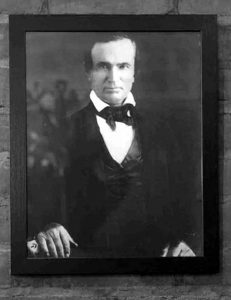The origin and decor of HipStir Cafe is inspired by Oneida’s founder, Sands Higinbotham. Our cafe sits directly across Farrier Ave from the park named in his honor.
History of Sands Higinbotham
It is said that “during his twenty-four years’ residence in Vernon he was known as an honorable and prosperous merchant, and as a wise and conscientious man whom all esteemed.” He was an intimate friend of many of the public men of the state, Governor Seward, Thurlow Weed and others. He re-moved with his family from Vernon to Oneida in 1834, where he had previously purchased large tracts of land — two hundred acres in 1827, and several hundred more in 1829. This is the land upon which the greater part of the city of Oneida now stands.
that “during his twenty-four years’ residence in Vernon he was known as an honorable and prosperous merchant, and as a wise and conscientious man whom all esteemed.” He was an intimate friend of many of the public men of the state, Governor Seward, Thurlow Weed and others. He re-moved with his family from Vernon to Oneida in 1834, where he had previously purchased large tracts of land — two hundred acres in 1827, and several hundred more in 1829. This is the land upon which the greater part of the city of Oneida now stands.
Sands, owner of the city site of Oneida, made a shrewd bargain with the Syracuse and Utica railroad. He gave the railroad free right of way across his land, plus ample ground for a station, on the condition that it stop every passenger train at the depot ten minutes for refreshments. Sands then built the Railroad House to serve meals to passengers. Both Oneida and Sands thrived.
Theo. F. Hand received his elementary education in the district schools of Vernon, and pursued the study of higher branches of learning in Cazenovia Seminary. At twenty years of age, he became a clerk in a store of general merchandise, and four years later in 1839, began his long career as a banker, being appointed teller and bookkeeper of the bank in Vernon.
Here he remained until 1851, when he came to Oneida, and with Niles H. and Sands Higinbotham, and Samuel Breese, started the Oneida Valley Bank, the first bank in the village. In the following year, the bank was incorporated under the laws of the State. As a State bank, it was operated till 1865, when it was organized as a National bank, the charter being renewed in 1885. After forty years of service as bank cashier, the daily duties were becoming too much for one of his age. Mr. Hand in 1890 was succeeded in this position by his son, Theodore Hand, Jr., he himself being elected Vice-President, holding also the same office in the Oneida Savings Bank, of which he was a Trustee.
Sand Higinbotham’s son, Niles was a good man too, a philanthropist in his efforts towards the city, following his father’s model.
Higginbotham, Niles, who died in Oneida, March 17, 1890, in the seventy seventh year of his age, was for years one of the foremost citizens of that village and a man who bore the respect and unqualified esteem of the entire community. He was a son of Sands Higinbotham and was born in Vernon, Oneida County, March 9, 1813. In 1827 he was sent by his father to the well-known school of Mr. Morse in Hamilton, and at the age of nineteen entered the store of Alexander Seymour at Utica where he remained about one year.
In March, 1834, at the age of twenty one, he entered the store of his uncle, Isaac Carpenter of Ithaca, with whom he later formed a partnership. When twenty four years old he severed this connection, and taking his little fortune went West with his close friend, Samuel Breese. They spent about two years buying large tracts of land which, in after years, became quite valuable.
In the spring of 1840, Mr. Higinbotham and J. P. Manrow took a contract on the old Erie railroad from Owego to Corning; the railroad company failed in less than two years, owing the young contractors about $100,000, of which they only received about $30,000. In the spring of 1849, they received their balance and paid their men in full with interest; Mr. Higinbotham often said that he never knew a prouder day than when these waiting men were paid. Mr. Sands Higinbotham, having bought from the State a large tract of unimproved land where Oneida now stands, had removed thither from Vernon as early as 1834, giving to the village its first impetus by presenting to the railroad (now the New York Central) lands and right of way, on condition that it should stop all passenger trains at Oneida, a contract observed until late in the Fifties.
Some years later, Niles Higinbotham bought large portions of land here from his father, and in 1844 built and commenced business in the old Goodwin store on Madison Street. There he remained as silent partner with his brother in law, Mr. Goodwin, for some years.
In December 1851, he organized the Oneida Valley Bank with Sands Higinbotham and Samuel Breeze. This was the first bank opened in Oneida, and was incorporated as a State bank in 1852, and as a National bank in 1865. Mr. Higinbotham was elected first president and retained that position until the day of his death. There were some traits of character very strongly marked in Mr. Higinbotham even as a young man. To the most transparent, honesty and uprightness in small, as well as great transactions, he added an independence which made him courageous in striking out for himself in any line of action where his judgment was once convinced as to the duty or reasonableness of the undertaking, and he was persevering and hopeful to a degree which never admitted in his often self-imposed tasks, either weariness or discouragement. These qualities eminently fitted him to join in and carry to even higher fulfillment the plans of his wise and public spirited father, for whom he had the most beautiful feelings of trust and affection.
Together they labored for the development of the little hamlet, and even in its early days Oneida began to be known as a busy and public spirited village, attracting to itself men of integrity and good character. Mr. Higinbotham’s efforts were put forth in behalf of religion, of education, of increased business and railroad facilities, of wide streets, and town extension on every side. In particular, he labored long and patiently to arouse public interest in the cause of higher education. It was one of the deepest wishes of his heart that Oneida should have an academic boarding and day school of the highest order, and he spared neither time, pains nor money in the effort to establish the Oneida Seminary on an honorable and scholarly basis.
Again and again he came to the rescue when the seminary was in need; started subscriptions, at times guaranteed and even paid from his own purse, the salaries of the teachers, and spent time and thought in securing fine school grounds, a good building, library, and apparatus, and became the personal friend and adviser of the teachers in everything that looked to the better equipment of the school, and the interest of the young people of Oneida and vicinity. In these, labors were associated with him as trustees of the seminary (which was opened in 1858), such men as Messrs. Breese, Hand, Ellinwood, Goodwin, Stone and others.
In everything that he did, Mr. Higinbotham had always in his mind to do that which should be best for the poor as well as the rich, and in many unostentatious ways he gave help to those whom he saw struggling under adverse circumstances. The park on lower Broad Street near the Central railroad, and the lands upon which stood all the church buildings except one, were given by Mr. Higinbotham.
On March 1, 1874, he was baptized in and united with the Presbyterian Church, of which many of his relatives were members, and he was, all his life, a reverent and constant reader of the Bible. During all his long life he preserved habits of temperance, purity and regularity, and he enjoyed almost uniformly good health until within a few years of his death. Mr. Higinbotham married, in 1849, Eliza, daughter of Nicholas P. Randall, an eminent member of the Onondaga County Bar. Of their union three daughters were born: Julia Randall, died February, 1895; Louise Adelaide, died in 1931; and Eliza Phobie Lily, died in 1919.
